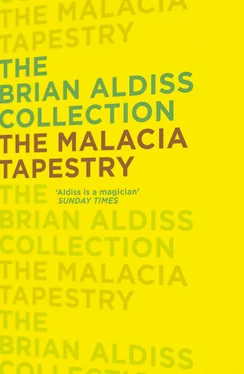Soon I kicked away my boots and breeches, and we were lying together without encumbrance on the wide prayer-bench of the Chabrizzi, who had certainly never had a better altar to worship at than the one I now clasped.
Armida’s last restraints were shed with her clothes – or so it appeared at first, for she seized with delight on what I had to offer and pressed her lips upon it, babbling to it as if it were a dolly, until I feared it would babble in its turn. And yet – even then, she would not allow what I desired. That was reserved for the man she married, she said, or she would have no value in the marriage market; such was the law of her family.
With that I had to rest content – and became content enough for the interdiction entailed the use of pleasant ingenuities to which lovers have become accustomed in our land. The world was lost, transmuted, in her delicious embraces. We enchanted each other until the sun faded from the rocks outside and the siderowels bellowed for their evening gruel. We dozed awhile. We went downstairs languidly, hand in hand through the bewildering passages, into a conflict of shadows. There were no ghosts, only changes in the air as we moved, vapours, and patches of chill or warmth or damp, to which our skins felt unusually sensitive.
Out in the front courtyard Armida’s coach was waiting. With a last amorous glance at me she ran forward, leaving me to wait in the gloom of the porch until I heard the rattle of the coach’s wheels die on the cobbles.
At that hour, my friends would be drinking in one of the inns of Stary Most. My mood was elevated; I felt no inclination to share my happiness. Instead, I walked through the city as evening thickened, determined to call on my priest of the High Religion, shaven-pate Mandaro.
Mandaro lived in a room with another priest, in one of the surviving quarters of the palace of Malacia’s founders. This edifice was the original Malacia. It had once been – and even in decrepitude still was – an enormous pile, almost a city in its own right. Most of it was dismantled, its stones, its gargoyles, its component parts pilfered to form later buildings, including the cisterns under the city and the foundations of St Marco’s itself. Of the surviving palace, not one of the original rooms remained to serve its original function in its original shape. The shifts of the poor hung from balconies where once the scarcely human ladies of Desport, our founder, had basked in the sun.
The denizens of the present, scratching a living for themselves, filled with noises the warren through which I moved. The atmosphere still whispered its linkage with the blind past.
Working my way into this slum, I climbed to the third floor and pushed Mandaro’s wooden door open. It was never locked. Mandaro was there as usual in the evening, talking to a man who rose and left with downcast eyes as I entered. The room had been partitioned down the middle, for the privacy of callers as much as for the priest; I had never seen the priest who lived in the other half of the chamber, although I had heard his deep melancholy voice raised in a chant.
Mandaro was on his balcony. He beckoned to me and I joined him. From a tiny cupboard he brought out a tiny spoonful of jam on a tiny plate, together with a glass of water, the traditional welcome of priests of the High Religion. I ate the jam slowly and drank down the yellowy water without complaint.
‘Something troubles you. Otherwise you would not have come.’
‘Don’t reproach me, father.’
‘I didn’t. I spoke a fact with which you reproached yourself. I can see that it is a pleasing trouble.’
He smiled. Mandaro was a man of early middle-age, well-built if thin. He looked hard, as if he were made of wood; something in the sharp planes of his face suggested he had been roughly carved. He grew a beard to compensate for his shaved head. The brown whiskers had a curl of grey in them, the sight of which reassured me; somehow it made him look less holy. His eyes were sharp, of an impenetrable brown rather like de Lambant’s and he directed them at you all the while.
I glanced away over his crumbling balcony, where night was closing in. The Satsuma lay below us, fitfully lighted, with its wharves and ships. Then came the Toi; a restaurant-boat floated down it, accompanied by sounds of music and a smell of cooking oil. On the far bank stood groves of ash jostling a line of ancient buildings. Beyond them, darkly, were vineyards and farther still, the Vukobans, visible as little more than a jagged line cut from pale night sky. The evening star shone. A chick-snake barked towards the Bucintoro. Singing drifted up, punctuated by laughter and voices from nearby rooms.
‘Something troubles me, and it is partly pleasing,’ I said. ‘But I feel myself as never before caught on the fringes of a web of circumstance. Those circumstances offer me advancement and a beautiful girl; they also involve me – well, with people I do not trust as I trust my friends. According to All-People there are dark things in the future. I shall gratify my senses until my carriage shatters.’
‘The wizards and magicians always offer dark things. You know that.’
‘I don’t believe him. Priests threaten dark things. What’s the difference?’
‘You don’t want a lecture on the differences between the Natural and the Higher Religions. They are opposed but allied, as evening mingles with dawn in our blood. They agree that the world was created by Satan, or the Powers of Darkness; they agree that God, or the Power of Light, is an intruder in this universe; the fundamental difference is that adherents of the Natural Religion believe that humanity should side with Satan, since God can never win; whereas we of the Higher Religion believe that God can triumph in the great battle, provided that human beings fight on his side rather than Satan’s.
‘This night seems peaceful, but fires burn under the earth …’
He was away, his imagination warmed by the drama he saw being surreptitiously enacted all about. I had heard and admired him on this theme before. While the performance was one I enjoyed, I hoped for more personal advice. Without wishing to be impolite, I could not appear one of the vacant faithful, swayed by eloquence as if I had none of my own: I remained gazing at the dark, flowing Toi. Like all priests, Mandaro could squeeze a message from a pebble, and incorporated my inactivity into his talk.
‘You see how peaceful night looks, how calm the river. Beauty itself is Satan’s most powerful illusion. How beautiful Malacia is – how often I think so as I walk its streets – yet it suffers under our ancestral curse. Everything is in conflict. Which is why we must endure two complementary but conflicting religions.’
‘But this girl, father –’
‘Beware of all things fair, my son, whether a girl or a friend. What looks to be fair may be foul under the surface. The Devil needs his traps. You should regard also your own behaviour, lest it seem fair to you but is really an excuse for foulness.’ And so on.
As I left him I reflected that he might as well have burnt a serpent on an altar as counsel me the way he did. I found my way down through the intestines of the ancient palace, until I was free of its whispering. The flavours of the river came to me, and the thought of Armida. I walked slowly back to the Street of the Wood Carvers; it was delicious to believe that Mandaro was right, and that Fate was keeping a goat-like eye on me.
The days passed. I neglected my friends and grew to understand Armida’s circumstances better.
Like all young ladies of her rank she was well guarded, and never officially allowed in the presence of men without Yolaria, her prune-faced chaperon. Fortunately, this rule was relaxed in the case of the Chabrizzi Palace, since the Chabrizzis were relations of the Hoytolas.
Читать дальше












